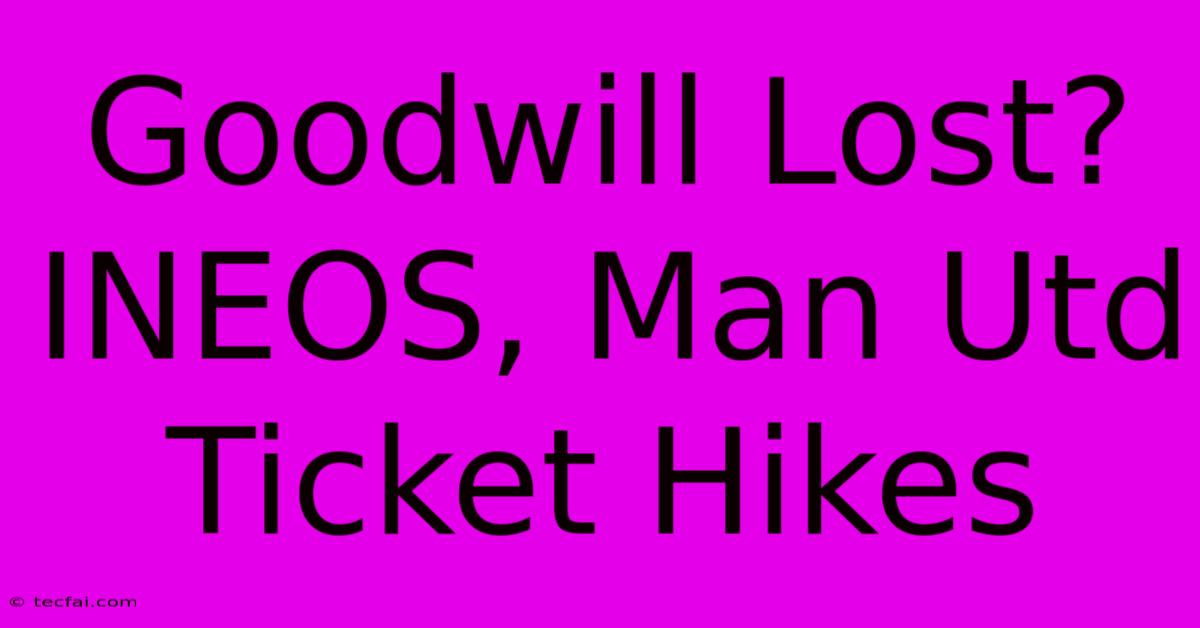Goodwill Lost? INEOS, Man Utd Ticket Hikes

Discover more detailed and exciting information on our website. Click the link below to start your adventure: Visit Best Website tecfai.com. Don't miss out!
Table of Contents
Goodwill Lost? INEOS, Man Utd Ticket Price Hikes Spark Backlash
The recent announcement of significant Manchester United ticket price increases, coinciding with the INEOS ownership, has sparked a furious backlash from fans. While the club cites necessary investments and improved matchday experience as justification, many feel the price hikes represent a betrayal of the club's history and a disregard for the loyal support base. This article delves into the controversy, examining the implications for INEOS, the club's relationship with its fans, and the broader implications for football's financial landscape.
The Price of Glory: How Much is Too Much?
Manchester United, under the stewardship of the INEOS group, recently unveiled a new pricing structure for matchday tickets. The increases, ranging from modest to substantial depending on the fixture and seating location, have ignited widespread anger amongst supporters. Many long-time fans feel the new pricing is inaccessible, pricing out loyal supporters who have been attending games for decades. This isn't simply about affordability; it’s about perceived value and a disconnect between the club's leadership and its fanbase.
INEOS's Justification: Investment and Improvements
INEOS has attempted to justify the price hikes by highlighting planned improvements to Old Trafford stadium and the overall matchday experience. They argue that these upgrades, coupled with the ambition to compete for major trophies, require significant financial investment. This investment, they claim, necessitates a higher revenue stream, hence the ticket price increases.
The Fan Perspective: More Than Just a Game
However, this justification has fallen flat with many fans. They argue that the price increases disproportionately affect the working-class supporters who have formed the backbone of the club’s support for generations. Many feel that the club is prioritizing profit over the loyalty of its core fanbase, a move perceived as cynical and damaging to the club’s identity. The argument extends beyond the price itself; it's about the erosion of trust and the feeling that the club is increasingly detached from its roots.
The Wider Implications: A Test Case for Football's Future?
The Manchester United situation is not isolated. Many football clubs are grappling with similar challenges, attempting to balance financial sustainability with fan affordability. The INEOS-Man Utd ticket price controversy, however, serves as a potent example of the potential fallout when this balance is disrupted. It raises crucial questions about the ownership model in football, the relationship between clubs and their supporters, and the increasing commercialization of the sport.
Damage to Brand Reputation: More Than Just Ticket Sales
The negative publicity surrounding the price hikes could have far-reaching consequences for INEOS and Manchester United. Damage to the club's brand reputation could affect sponsorship deals, merchandise sales, and even future ticket sales. Losing the goodwill of its core fanbase could be a far more significant blow than any short-term financial gain from increased ticket prices.
Looking Ahead: Finding a Sustainable Path
The controversy highlights a critical need for a more sustainable model of football club management. Open communication between club owners and supporters is essential to address concerns and build trust. Finding a balance between financial needs, stadium improvements, and maintaining an affordable experience for fans requires careful consideration and perhaps a willingness to explore alternative revenue generation strategies. The future of Manchester United, and indeed many other football clubs, depends on navigating this delicate balancing act successfully. Failing to do so risks alienating the very fans who are the lifeblood of the game.

Thank you for visiting our website wich cover about Goodwill Lost? INEOS, Man Utd Ticket Hikes. We hope the information provided has been useful to you. Feel free to contact us if you have any questions or need further assistance. See you next time and dont miss to bookmark.
Featured Posts
-
Amorims Man Utd Verdict Old Trafford Reaction
Nov 29, 2024
-
Nfl Fans Troll Bears Harlow Hype Shaboozey
Nov 29, 2024
-
Thanksgiving 2024 H E B Houston Store Hours
Nov 29, 2024
-
Gib Vs Slim Misfits Boxing 19 Highlights
Nov 29, 2024
-
Konate Bradley Liverpools Injury Fear
Nov 29, 2024
